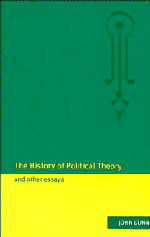Book contents
- Frontmatter
- Contents
- Preface
- Acknowledgements
- 1 Introduction
- 2 The History of Political Theory
- 3 Contractualism
- 4 Political obligation
- 5 Trust
- 6 The claim to freedom of conscience: freedom of speech, freedom of thought, freedom of worship?
- 7 Property justice and common good after socialism
- 8 The dilemma of humanitarian intervention: the executive power of the Law of Nature, after God
- 9 Specifying and understanding racism
- 10 Political science, political theory and policy making in an interdependent world
- 11 Democracy: the politics of making, defending and exemplifying community: Europe 1992
- 12 Is there a contemporary crisis of the nation state?
- 13 Political and economic obstacles to rapid collective learning
- 14 The heritage and future of the European left
- Index
8 - The dilemma of humanitarian intervention: the executive power of the Law of Nature, after God
Published online by Cambridge University Press: 05 February 2010
- Frontmatter
- Contents
- Preface
- Acknowledgements
- 1 Introduction
- 2 The History of Political Theory
- 3 Contractualism
- 4 Political obligation
- 5 Trust
- 6 The claim to freedom of conscience: freedom of speech, freedom of thought, freedom of worship?
- 7 Property justice and common good after socialism
- 8 The dilemma of humanitarian intervention: the executive power of the Law of Nature, after God
- 9 Specifying and understanding racism
- 10 Political science, political theory and policy making in an interdependent world
- 11 Democracy: the politics of making, defending and exemplifying community: Europe 1992
- 12 Is there a contemporary crisis of the nation state?
- 13 Political and economic obstacles to rapid collective learning
- 14 The heritage and future of the European left
- Index
Summary
There are at least three possible types of view about the justifiability of the use of force by states or private individuals on behalf of other private individuals or groups who are the direct victims of brutal and gratuitous coercion by another state. The first type of view is that no human being, and a fortiori no state, can be justified in using force under any circumstances and for any purpose, because (and only because) force is an intrinsic evil. This unflinchingly deontological view is generous but practically absurd. The second type of view is that states (or even private individuals) can be, and often are, justified in using force against the brutally coercive actions of another state when, but only when, the latter is acting outside its own territorial jurisdiction. At least in the case of states what grounds that justification is their entitlement to defend themselves against foreign (as against domestic) aggression, and to defend also any other states with whom they have linked themselves either by standing alliances or by solemn common undertakings to secure each other's safety and sovereignty within the bounds of international law. In the case of private individuals, the corresponding justification would lie in their several personal entitlements to defend themselves as best they can against aggression (a descendant of the classic early modern use of the private law argument (Skinner 1979, II, pp. 343-4, 347)).
- Type
- Chapter
- Information
- The History of Political Theory and Other Essays , pp. 136 - 147Publisher: Cambridge University PressPrint publication year: 1995



